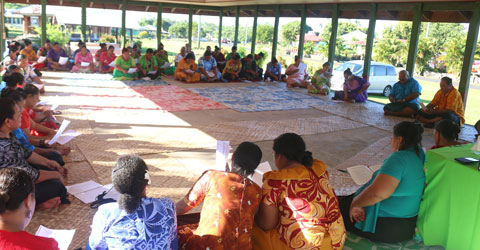

The following is an article from a Community Grant recipient.
I am the Executive Director of the Matuaileoo Environment Trust Inc. (METI), a Samoan charitable trust that promotes sustainable living by supporting self-reliance in grassroots communities. One critical component of this sustainable living is the adoption of a whole food, plant-based (WFPB) diet, which addresses many of the most costly and deadly health challenges affecting our small Pacific island nation: obesity, type 2 diabetes, hypertension, heart disease, and other noncommunicable diseases (NCDs).
Non-communicable diseases like these have become epidemics in Samoa. In our population of just over 200,000, 80% are overweight or obese. According to health statistics in 2010, nearly 25% of Samoan adults were diagnosed with type 2 diabetes, and that hasn’t improved in the decade since—according to WHO officials, the rate is now 30%.
These challenges are further complicated by the particular social structure of Samoa. There are more than 350 villages spread throughout the 2 largest inhabited islands alone; reaching out to all of them, much less encouraging dietary change, is its own challenge. That’s why self-sufficiency is so important, and it’s why we rely on our Taiala program.
One critical component of this sustainable living is the adoption of a whole food, plant-based (WFPB) diet, which addresses many of the most costly and deadly health challenges affecting our small Pacific island nation.
Taiala, Samoan for “path-breakers,” are frontline health, education, and sustainable development workers. They are ordinary men and women from various backgrounds— they might be chiefs, orators, retired public servants, housewives, or others still; however, what they all have in common is that they are sons and daughters of the villages in which they live and work. Because of that, they are able to command some level of respect and trust in their communities. Provided that they are well trained and passionate about helping their neighbors they can be powerful agents of change capable of integrating activities in multiple sectors like health, education, agriculture, and sustainable development.

In 2018, METI started a project involving four villages to combat the prevalence of NCDs. At the completion of the project, 75% of those suffering from type 2 diabetes, high blood pressure, and heart disease had reversed their conditions and regained their health. There were however significant differences in NCD-reversal rates between the villages, ranging from 93% to a low of 46%. We analyzed the results and identified five conditions at the village level that facilitated more dramatic improvements:
Thanks to the grant support from CNS, we hope to replicate the successes of this project in more villages throughout Samoa.
After more than 20 years of work, METI is better equipped than ever before to encourage lasting community-driven change. In addition to our village-wide projects, we also run the Samoa Sleep Clinic, where many patients suffering from obstructive sleep apnea are being diagnosed and treated, and our Healthy Living Clinic, which has been focused on the root causes of NCDs and hosting interactive seminars in both English and Samoan since 2013. To improve my nutritional knowledge, I completed the Plant-Based Nutrition Certificate Course from CNS and eCornell. We continue to learn and improve, and we plan to keep empowering others to do the same!
We’ve already had great success in reversing diabetes and hypertension in several well-known personalities, including a former minister of health and Samoa’s current high commissioner in Canberra!
The T. Colin Campbell Center for Nutrition Studies (CNS) is committed to increasing awareness of the extraordinary impact that food has on the health of our bodies, our communities, and our planet. In support of this commitment, CNS has created a Community Grant initiative to empower sustainable food-based initiatives around the world by providing grants to enable innovative start-ups and to propel the growth of existing initiatives. Please consider making a donation to this great cause. 100% of your donation will go to support initiatives like the one you just read about in this article.
Copyright 2024 Center for Nutrition Studies. All rights reserved.